Helen Currie
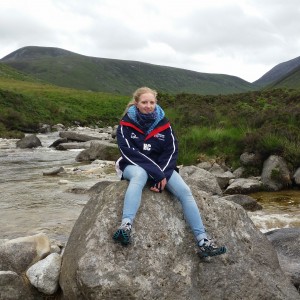
Background
I graduated from the University of Newcastle upon Tyne in 2010 with joint honours Biology & Psychology BSc (Hons). In 2013 I progressed my studies at the Queen’s University of Belfast, graduating with an MSc in Animal Behaviour and Welfare. My research project looked at the effects of anthropogenic noise on avian bioacoustics. Upon graduation I worked back in Newcastle University, interning as a research assistant at the ‘Centre for Behaviour and Evolution’ within the ‘Institute of Neuroscience’. I joined the iPhD CDT-SIS programme at the University of Southampton in September 2015 (sponsored by NERC and Fishtek).
Research Interests
My main interests are in animal communication (particularly bioacoustics), and how environmental and genetic effects influence differences in behaviour. I am especially interested in the ecological impacts of anthropogenic structures and how animals have to adapt in accordance with them in order to survive.
Research Project
Based within the ‘International Centre for Ecohydraulics Research’ (ICER), my research project will look to develop understanding of fish response to sound. My subject species is the European eel (Anguilla anguilla), a critically endangered species experiencing increased mortality rates at anthropogenic barriers which impede upon migratory routes. Results may potentially assist in the development of a successful behavioural deterrent device. |
Nicholas Flores Martin
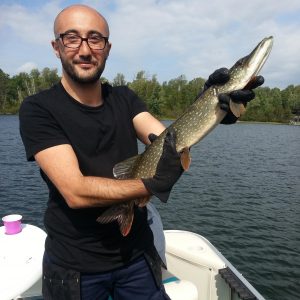
Background
I graduated from the University of Malta with a BSc (Hons) in Chemistry and Biology (2004 – 2008), and
studied Oceanography to Masters level (2010 – 2011) at the University of Southampton. After graduation, I worked for the Maltese Department of Fisheries and Aquaculture (2013 – 2015). During this time I coordinated fisheries data collection efforts to meet EU obligations with respect to the Data Collection Multi-Annual Programme (DC-MAP) under the CFP, was involved in developing and giving feedback for proposed Good Environmental Status (GES) definitions, indicators, and monitoring programmes to meet Malta’s obligations with respect to the MSFD, and managed Malta’s Gap 2 case study on trawler fisheries management.
Research to date:
- Identification and mapping of nursery and spawning grounds for key species targeted by bottom trawlers within Malta’s 25 NM Fisheries Management Zone, as part of the Gap 2 project to engage fishers in participatory research;
- Use of ambient noise by the East Pacific grey whale (Eschrictius robustus) for navigation and foraging;
- Marine litter and microplastics on Maltese beaches;
Research Interests
My interests include underwater and cetacean acoustics, fisheries management, water sanitation in developing countries, and environmental impact assessment.
Research Project
My project involves helping to develop a behavioural guidance system for the European eel (Anguilla anguilla), a critically endangered species which has declined due to several factors including barriers to its migration such as hydroelectric plants. Potential methods include acoustic barriers (particularly infrasound at frequencies of < 20Hz), electrical and bubble screens, and changes in current direction and velocity.
|
Richard Deacon
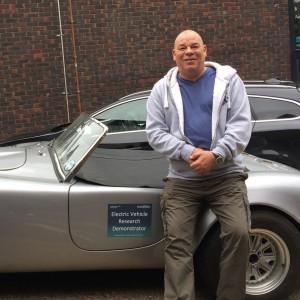 Background Background
I studied psychology to BSc at the University of Southampton, and continued on to study research methodology to Master’s level. In September of 2015 I joined the CDT-SIS, Transport Research Group to study for an iPhD.
Research Interests
My specific field of interest is the way in which humans interact with technology and its subsequent impact on the environment.
Research Project
My research project is entitled “Mitigating Range Anxiety and Reducing Energy Consumption by Drivers in Electric Vehicles”. This project is jointly funded by The Engineering and Physical Sciences Research Council and Jaguar Land Rover. This project aims to test the effects of new driver interfaces that will be developed within the project and will help to realise the potential of electric vehicles in developing Sustainable Infrastructure Systems to support their deployment in the future. |
Luke Hutchinson
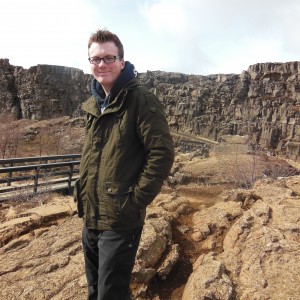
Background
I graduated in 2015 from Oxford Brookes University after initially completing a BSc in Motorsport Engineering and then progressing onto an MSc in Mechanical Engineering. I have a strong interest in Sustainable Engineering and have undertaken research projects into renewable energy production technology and the integration of natural materials into modern vehicle construction.
Research Interests
- Renewable Energy Production
- Energy Losses in Transportation
- Wireless Power Transfer
- Control Theory
- Autonomous Vehicles
- Sustainable Transportation
Research Project
My research project is in partnership with the Transport Research Laboratory and aims to optimise the charging infrastructure to support electric vehicles. Electric vehicles have the ability to reduce our dependency on petroleum products, lower transport related CO2 emissions and improve air quality within cities. However, the take up of EV’s has been slower than initially predicted and the inconvenient charging infrastructure has contributed towards this. I intend to develop a modelling framework to optimise the network distribution of both static and dynamic wireless charging systems alongside traditional plug-in charging stations. |
Gerardo Espíndola García
 Background Background
Graduated in 2010 from Universidad Autónoma de Nuevo Leon in México with a BSc degree in Mechatronic Engineering; From 2010-2014, he worked for a manufacturing company as Research, Development and Automation Engineer where he was in charge of the automation of the production lines of manufacture and decoration of PET containers as well as the R&D of new products and decoration techniques related to PET products. In 2015 he completed his MSc in Advanced Mechanical Engineering with Mechatronics as main topic in the University of Southampton and joined the iPhD program at CDT-SIS group.
Research Project
The aim of his research is to develop novel sensors using embedding rugged thick film electrodes in earthworks trying to detect changes in soil parameters such as conductivity and water content and determine if those changes are indicative of earthwork displacement. |
Miguel Vivas Mefle
 Background Background
I am an MSc graduate in Civil Engineering from the University of Granada (Spain) and an MSc graduate in Geotechnical Engineering from the University of Birmingham. My work experience consists of more than 9 years working as CDM Co-ordinator and Design Engineer in Motorways and High Speed Railways projects of singular relevance in Spain.
Currently, I am undertaking an IPhD in the Centre for Doctoral Training in Sustainable Infrastructure System (CDT-SIS) at the University of Southampton in a research jointly funded by the Engineering and Physical Sciences Research Council (EPSRC), the University of Southampton, Network Rail and Amey.
Research Interests
My research interests are in the field of Slope Stability Analysis in saturated and unsaturated soils and the effects of multiple variable factors in the slope stability as vegetation, temperature, rainfall or compaction degree, among others.
Research Project
My research project: “Vulnerability of Railway Earthworks to Future Extreme Weather Events”
is mainly aimed to determining the changing nature of railway earthwork slope risk factors in the future due to the incoming climate change and to the development of a suited algorithm for the soil slope hazard index accounting for the expected future extreme weather events. |
Hannah Young
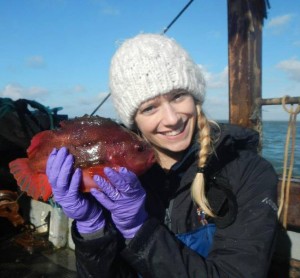 Background Background
I graduated in 2010 with a BSc in Oceanography from Southampton University and went straight on to attain an MSc in Aquatic Resource Management from Kings College London. Between 2011 and 2015 I worked as an Environmental Consultant for an international engineering firm, specialising in ecological impacts assessments for coastal energy infrastructure.
Research Interests
During my time working within the private sector, I gained a valuable insight into the challenges faced by industry, regulators and governments which are striving to preserve the ecological integrity of our environment whilst ensuring the energy security of the country. I have developed a passion for wanting to improve the marriage between these sometimes conflicting interests via the development of sustainable infrastructure.
Research Project
My research topic focuses on the critically endangered European eel (Anguilla Anguilla) which is particularly vulnerable to anthropogenic mortality in rivers and coastal regions due to the presence of energy infrastructure such as hydropower structures and power station abstraction points. I intend to model the life history of the European eel in order to determine the key factors within their life cycle which governs population success. Using this information I aim to carry out a robust cost‑benefits analysis of possible mitigation measures to determine where action should be most effectively and appropriately directed to protect populations of this endangered fish.
|
Michael Parkes
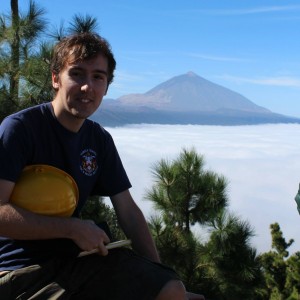 Background Background
I graduated in 2014 with a BSc (Hons) in Geology from the University of Southampton, and continued straight onto an MSc in Engineering Geology at Portsmouth University (2014-2015).
My research to date includes:
– The geological evolution of the Srednogorie Zone, Bulgaria
– Geological and geotechnical assessments of economically important regions and mining sites
– Forensic assessments of earthen and concrete dams
I have also worked in collaboration with the British Geological Society utilising computational modelling software. The work determined new driving mechanisms for slope instability along the Holderness Coast and is assisting current coastal management plans in the region.
Research Interests:
Specific areas of interest to me are the development of sustainable design solutions, soil-structure interactions, geotechnical site investigation methods and project management.
Research Project:
The aim of the project, is to explore the real behaviour of Overhead Line Equipment (OLE) foundations by means of full-scale measurements in the field and advanced dynamic analyses of the soil-structure interaction responses. With Network Rail’s national electrification programme of substantial sections of the rail network, the project will observe and qualify the issues associated to over conservative design associated to current specifications. The project then seeks to incorporate findings into methods and appropriate design assumptions for increased design efficiency and implementation. |
1 pings
RIBES Network School hosted by the University of Southampton – Sustainable Infrastructure for Cities
March 24, 2021 at 10:14 am (UTC 0) Link to this comment
[…] on TEAMS from 22-25 March 2021. Prof Paul Kemp, Prof Paul White, Dr Andrew Vowles, Helen Currie (CDT SIS), Philip Ericsson and Luocheng Wu attended this event and presented their projects to the group of […]